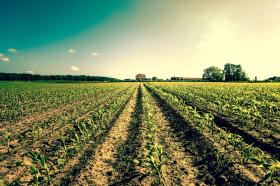Farmers vs. scientists on the debate over climate change

Crop producers and scientists hold deeply different views on climate change and its possible causes, a study by Purdue and Iowa State universities shows.
Associate professor of natural resource social science Linda Prokopy and fellow researchers surveyed 6,795 people in the agricultural sector in 2011-2012 to determine their beliefs about climate change and whether variation in the climate is triggered by human activities, natural causes or an equal combination of both.
More than 90 percent of the scientists and climatologists surveyed said they believed climate change was occurring, with more than 50 percent attributing climate change primarily to human activities.
In contrast, 66 percent of corn producers surveyed said they believed climate change was occurring, with 8 percent pinpointing human activities as the main cause. A quarter of producers said they believed climate change was caused mostly by natural shifts in the environment, and 31 percent said there was not enough evidence to determine whether climate change was happening or not.
The survey results highlight the division between scientists and farmers over climate change and the challenges in communicating climate data and trends in non-polarizing ways, Prokopy said.
"Whenever climate change gets introduced, the conversation tends to turn political," she said. "Scientists and climatologists are saying climate change is happening, and agricultural commodity groups and farmers are saying they don't believe that. Our research suggests that this disparity in beliefs may cause agricultural stakeholders to respond to climate information very differently."
Climate change presents both potential gains and threats to U.S. agriculture. Warmer temperatures could extend the growing season in northern latitudes, and an increase in atmospheric carbon dioxide could improve the water use efficiency of some crops. But increases in weather variability and extreme weather events could lower crop yields.
Growers can manage the potential risks linked to extreme rain events and soil degradation by using adaptive strategies such as planting cover crops, using no-till techniques, increasing the biodiversity of grasses and forage and extending crop rotations, Prokopy said. These strategies contribute to soil health and water quality and also help capture carbon dioxide, reducing the amount of greenhouse gases released into the atmosphere by agricultural systems.
Currently, agriculture accounts for 10-12 percent of the total human-caused greenhouse gas emissions globally.
Continue reading at Purdue University.
Farm image via Shutterstock.
2014©. Copyright Environmental News Network